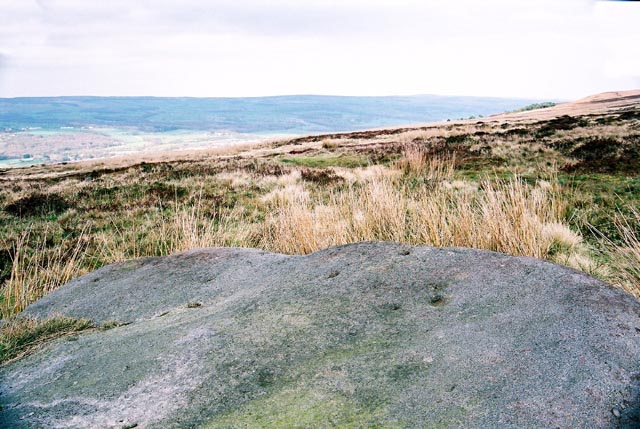




The area a few hundred yards to the east of the Badger Stone has a scattering of cup and ring marked rocks, including the curious ‘Pitchfork Rock’. Search amongst the waterlogged ground and spring heads for a few beauties!

Pitchfork Rock, Green Gates, Ilkley Moor.

The Pitchfork Rock, Green Gates, Ilkley Moor.

Cup marked rock near the Badger Stone, Green Gates, Ilkley Moor.

Cup and ring stone at Green Gates, Ilkley Moor.

The large bowl in what I call the ‘Boundary Stone’ by the path on the edge of Green Crag. The more I visit this stone, the more I am convinced of it’s importance in the prehistoric landscape of this part of the moor.
The bowl has a hole at the bottom that allows liquids to flow out and down the stone.

Cup and ring marked rock, Green Crag.

Single cup marked rock, Green Crag Enclosure.

A single cup marked rock, Carnshaw Thorne Hill, Ilkley Moor.

Another curious masonic mark, this time near the hill top cairn on Cranshaw Thorne Hill.


Large weathered rock at West Buckstones.
Either approach from the usually boggy path from the Wetstone Gate transmission masts to the east, or along the forestry wall up from Rivock Edge.
A large scatter of boulders, one of which is used as a boundary stone still. A number of rocks bear large cups similar to those on the ‘entrance stone’ at Willy Hall’s Wood and one large, upended triangular boulder is beautifully weathered.

Cup marked rock at Backstone Beck enclosure.
The walls here look so good ‘cos they were excavated and rebuilt in the late 1980’s. Excavations revealed signs of settlement on this spot stretching back 9000 years. Possible started as a mesolithic hunting camp.

A curious little standing stone on the path between the Grubstones and the Twelve Apostles, bearing what looks to be a Masonic emblem.
Maybe a prehistoric standing stone, or maybe the work of the 16th C Walter Hawksworth, known to be a mason and erecter of stones around these parts??
Took the path up through the wonderful Troller’s Ghyll to Skyreholme and found three carved rocks (there’s many more but didn’t have time to look) and possible rubble walling nearby.






Pic of the well showing the stonework box. There’s also an old trough lost in the brambles next to it.
On a visit to this site that was well known to me during my childhood, I found the site changed slightly. The old stone gutter is gone and the water now flows into a round concrete basin and disappears underground. A low wall has also been built at the back of the spring.
A search of the nearby rocks revealed no further clues such as carvings.



Rocking Stone with possible cup marks at Brimham Rocks.


An amazing array of weathered outcrops and rock idols absolutely crawling with people. Go on a pissy, cold day in winter to avoid the hoards.


Possible cup marked rock, Soldier’s Trench, Shipley Glen.

Situated above Shipley Glen and overlooked by rock art on Baildon Moor to the north and east, this sad little circle lies near the road which destroyed a section of its northern end. It’s hard to distinguish amongst the rock scatter and fallen stones, but a couple of (largely reconstructed) double arc settings give it away.
Camping at Dobrudden was a great experience. Within half an hour of rolling out of bed each morning, I was out walking the dogs and searching for rock art. Most of the photos I’ve uploaded are from the ridge on which the campsite/caravan park sits, but from what I see here, I’ve missed quite a few. More carved rocks and a possible stone circle are on the next ridge down near the curve in the Brackenhall Road.
I also found a faint, vaguely circular enclosure to the east of the caravan park.
Also worth noting is the livestock on the campsite. Turkeys, geese, chickens and peacocks! Watch out when you’re reversing!

Dobrudden stone, taken at night using directional flash.








Three cups with single ring on the path leading west from the campsite, Baildon Moor.

Single cup marked rock, looking towards Baildon Hill, Baildon Moor.

An apparent low circular enclosure – possible remains of a ring cairn or hut circle, Baildon Moor.

Double cup and ring, near the well known stone set into Dobrudden Campsite wall, Baildon Moor.